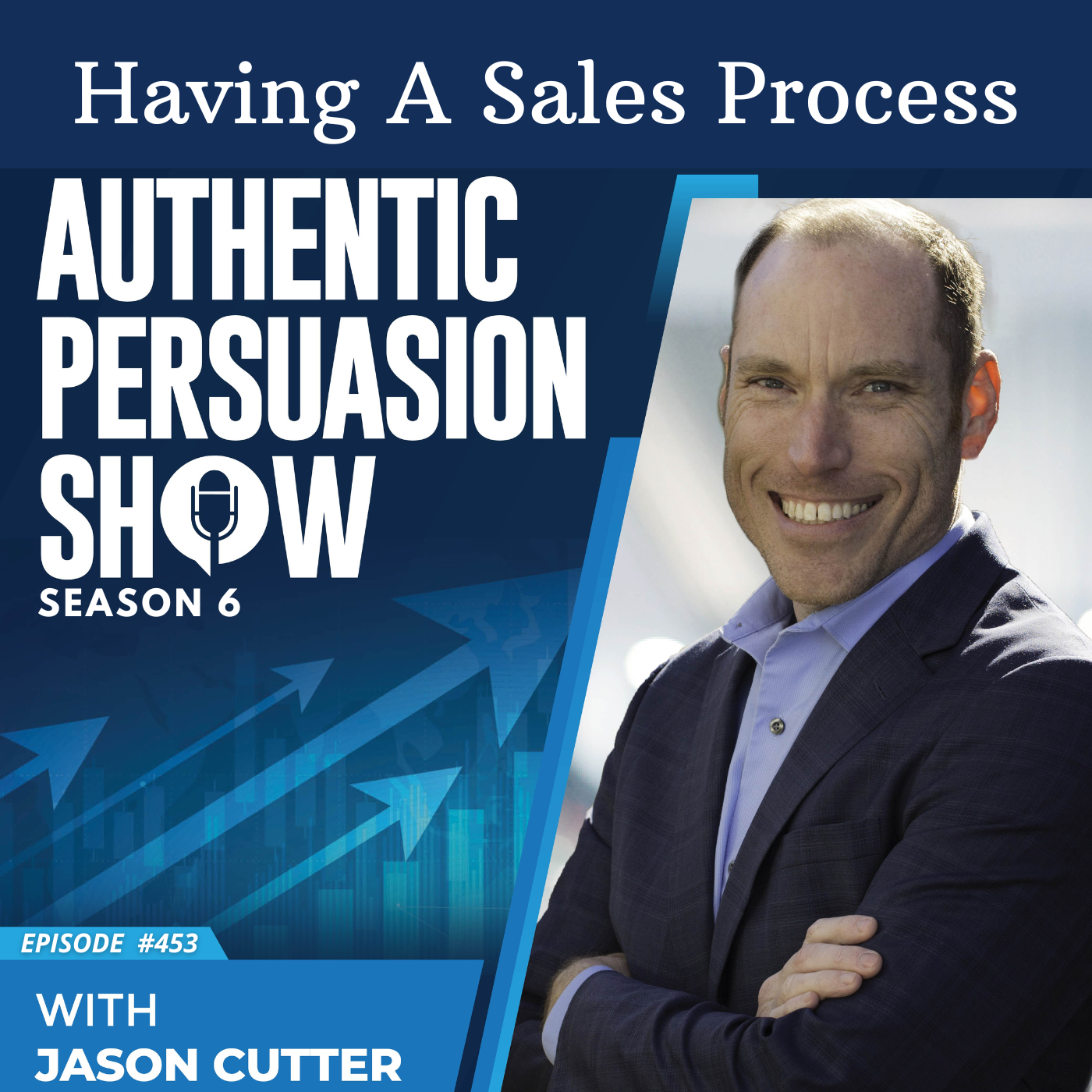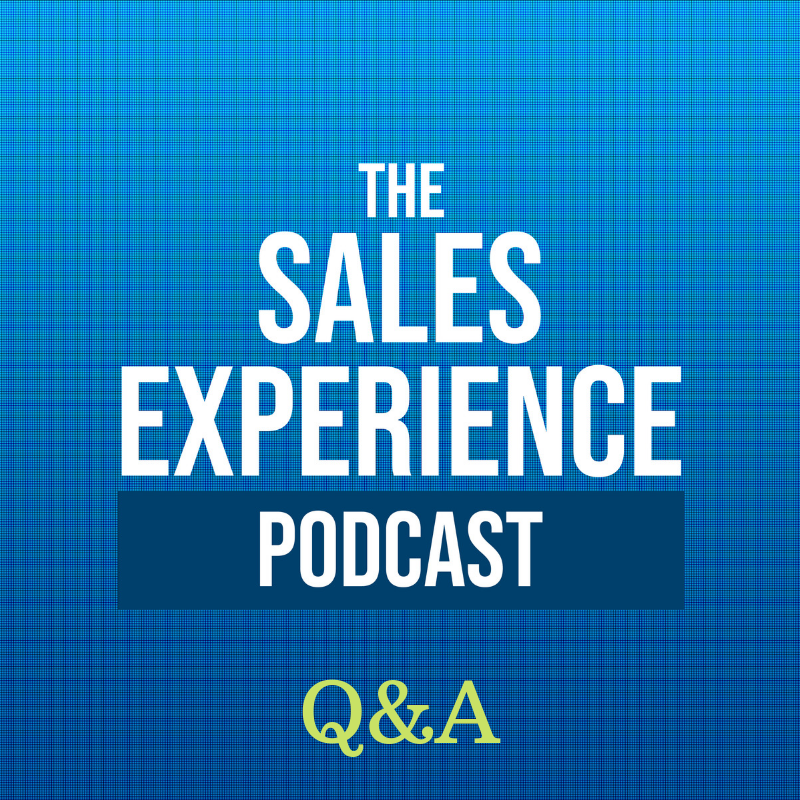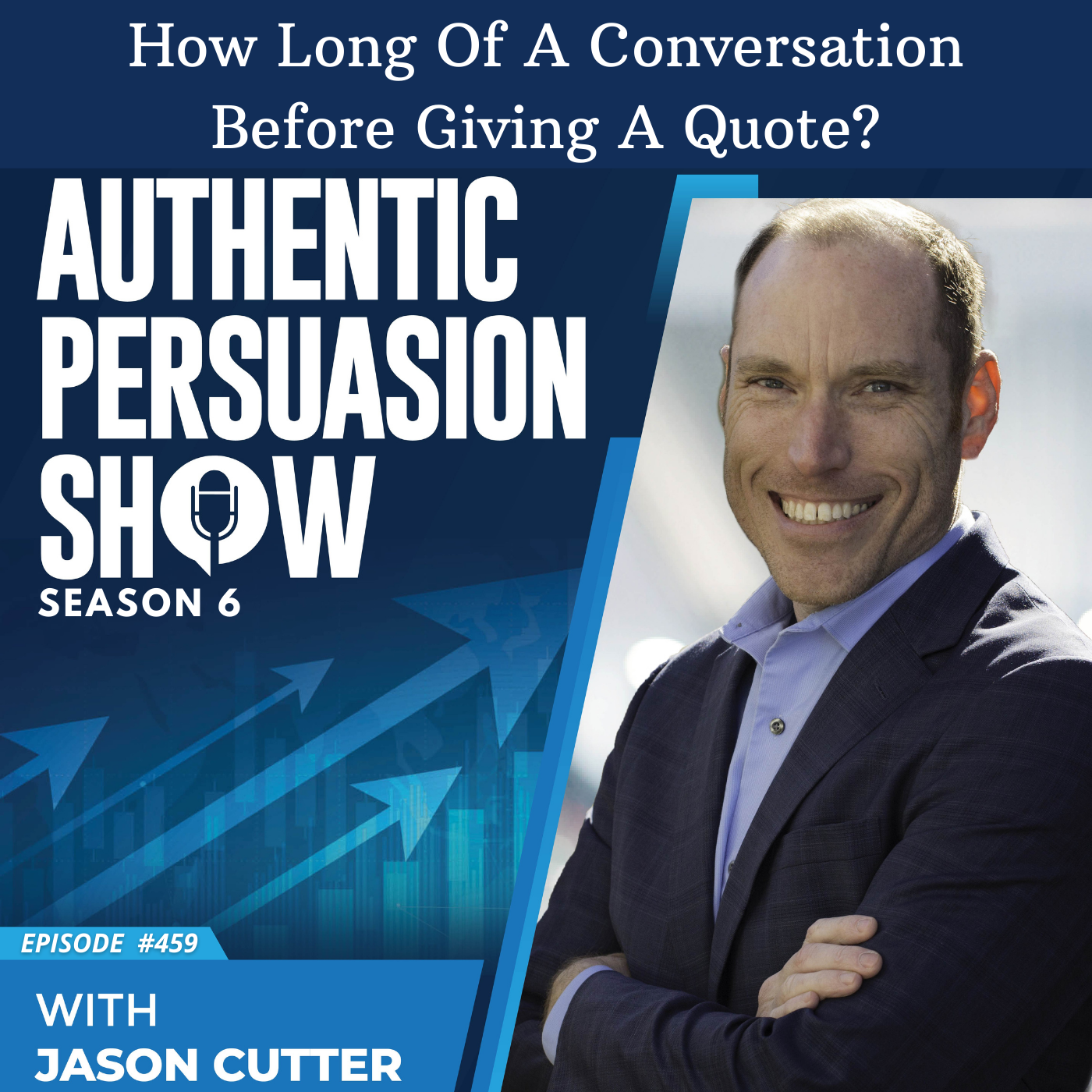Show Notes
This is the third installment of the conversation I had with Mark.
In Part 3, Mark and I talk about:
- Ensuring there is value in having the next call/meeting
- Should you do demos?
- What makes for a successful salesperson
- Building champions
- How complex the world has become, and how to adapt your sales process
Download The Power of Authentic Persuasion ebook
Enroll in the Authentic Persuasion Online Course
Connect with Jason on LinkedIn
Connect with Mark on LinkedIn
Mark’s Info:
As a teenager, watching 14 videos in the back storeroom on a 7″ black and white TV to learn how to sell shoes at the mall was a great foundation. Running a small business with 200+ employees taught me how to be organized. Creating a highly profitable sales territory from one dead for a decade was hard work. Managing 12 salespeople across 9 states cemented my sales philosophy.
Building a sales team with, by far, the best, smartest, hardest working people I’ve ever worked with…well, that’s an honor and privilege I get to enjoy every day.
LinkedIn: https://www.linkedin.com/in/mkosoglow/
Twitter: https://twitter.com/GIDselling
Website: http://www.getitdoneselling.com/
Also check out: https://www.outreach.io/
E136 – Transcript
Jason: Welcome to the sales experience podcast. My name is Jason Cutter, so glad that you’re here. You are in the middle of a guest episode mini-series. My conversation with Mark Kosoglow and we are talking about the sales experience. If you haven’t checked it already, go to the cutterconsultinggroup.com website, make sure to find the transcript and all of Mark’s links, all of his information and if you want, he has a show called the sales engagement podcast. You can also find him on linked in. It’s a great place to find him and everything that he’s been doing and we are just having a conversation on a roll talking about sales, sales experience, sales engagements, selling demos, what that looks like, how to build that process. So without any further adieu, let’s roll right into part three.
Jason: Like you said, you know what matters the most to me, what does it matter to me? It’s the kind of experience that I enjoy versus let’s say even if you go to a trade show and you walk up to a booth and somebody just wants to give you their two minute monologue and their pitch and tell you how the app works or their product or service works for everybody but it doesn’t actually apply to you. Right. So what you’re talking about is that experience where you know, you’re figuring out who they are and then approaching that.
Mark: Yeah, I think the fact of the matter is the vast majority of people are visual learners. And if you don’t give them something to look at like a slide or two or three or four or five, then you’re not going to take advantage of how people absorb information best. So I’m not saying don’t use slides, but what I am saying is, is don’t take me through the slides that says, Oh, I’m the number one place to work in Seattle. Click and you know, we blah blah blah blah, blah this. And it’s a bunch of stuff that like doesn’t really matter to me cause I don’t understand how it helps me. Helps you solve my problem.
Jason: Yup. Now it’s interesting because you know, the visual side is there’s an over-under and I try to teach salespeople this as well. It’s don’t just sell the demo. A lot of people try to sell in the phone call to get somebody to go on a demo. The demo or the slides are a tool to get you to the result, but shouldn’t be a necessary thing. Right? It shouldn’t be a crotch. I see a lot of people who, their first call, they’re selling the demo. Okay, let’s just do a demo and I can show, you know, like my goal is to help determine if you’re a good fit and then if so, I want to basically sell you. And you know, the demo is almost optional.
Mark: Mmm. So you want to do a, he said, she said you want to go back and forth on this one a little bit. All right. So I think that the demo is an extremely necessary step and it must be, and it must be sold. And so we talk about, uh, no meetings as a success unless you book the next meeting. That needs to happen. And I know everybody agrees with that, but I think that the thing is is a lot of times reps don’t understand that you have to sell the next meeting. Like you sell the value of your product. Like what is the value of me meeting with you again, Jason, if we just did a discovery call and now you understand all this stuff about me, like what are you going to wrap it into? That’s valuable for me to show up to another meeting.
Mark: And the other thing is most people want to book that next meeting next week. I’m like, let’s book it tomorrow. Yeah. My again, Matt Millen always used to tell me like when is now a good time? Like right now. Yeah. So I think that the demo is, especially with technology sales and important part, people have a difficult time. I think trusting your technology if they can’t see how it works. And then secondly is when you get to the point in the call, when you’re ready to start booking the meeting, you need to understand how you position the value. That meeting makes sure that somebody wants to show up. So that’s how we think about it here.
Jason: I think that’s great. And I completely agree with all of that. And what I’ve seen is a lot of salespeople, or even like SDRs are kind of newer, AEs are not as strong. AEs were there in that first call. They’re, you know, selling and booking the demo call, but they’re selling basically the demo as the thing that they’re going to be presenting versus the demo being a part of the solution. Like, so they did the discovery, the answer, ask their questions, they got their info, and it’s like, okay, on the next call I want to show you how, you know, we’ll be able to help you instead of, okay. On the next one I’m going to walk you through a demo so you can see the demo and how the demo works and how our software works, right? So they’re selling the demo, like selling the demo as the end result.
Jason: And then what happens is somebody gets on that second call, they sit through the demo, they feel like they bought the demo and they’re like, okay, cool, thanks for the demo. Now send me some information. Right? Versus the demo being a hammer in the toolbox and like, I’m going to show you it and we’re gonna use it to solve your problem and that little shift, right? Cause I completely agree with you. You always got to book the next one as soon as possible and sell the next call and the value, the value of the next call and the demo call is okay, now let me show you how you know we’re going to help you and how this fits for your situation.
Mark: Yeah. I’ve found that what you’re talking about is a symptom of someone that believes that if they can just show someone the product, they’ll buy it and it puts all the work on the buyer. Like I’m going to show you this great demo, which you’re going to have to figure out how it works inside your business. You’re going to have to contextualize it to your situation and you’re going to have to understand like how the ROI works. But like if I can just get you to the demo, I’ll have a chance. Or they have a sales leader that is really big on stage one to stage two conversion and like they’re being measured on that and that’s important to them and is creating, the leader has created an environment where the demo is what they’re selling because that’s what they’re being evaluated on. And there’s some place, some places that’s what they’re compensated on getting people the demo and, and I think to your point, that’s when you get these really weird situations where you do this demo and then the rep has no idea what to do after the demo.
Jason: No. And, uh, in my experience and the label I’ve been using a lot recently, is there an order taker more than a salesperson? So like you’re saying, they’re feeding up the demo, they’re letting the prospect or making the prospect decide whether they want to buy it or not. And the account executive, the salesperson B to B or B to C is just sitting back waiting, you know, to take the order if somebody wants to buy instead of, you know, moving it forward like a salesperson.
Mark: Yeah, no doubt. No doubt.
Jason: So next question here. Next topic. What do you see that top salespeople do that make them successful? Well, in addition to what we’ve been talking about.
Mark: Yeah, I think we talked about a lot of it. Like, listen, I think that if you’re in a complex deal, the two things that I see great salespeople too is they build champions really, really well. They understand that 70% of the selling of the product that they’re doing is that without them in the room and they aren’t building being someone that is an internal seller, a champion that can sell when they’re not in the room. And the second thing I’m seeing is that they build multiple champions. So they’re not single threaded. There’s not one single point of failure in their deal. Like they’re going to have to fail on two or three or four or five different people rather than just one guy that couldn’t get it done. So those are the two things. And then that goes, we do the number one mistake I see with salespeople right now is they confuse a coach and a champion.
Mark: They think if somebody likes them and takes a call, but that’s a champion and that’s not a champion. That can be a coach, that can tell you what to do. But a champion is something very specific and someone that has influence over the decision, they have the access to the right people so that they can use that influence. And lastly, there’s something that is personally beneficial to them. So they have some skin in the game. And so I think like when you’re really selective on who a champion can be, you’re really good at building them and then you build out multiple champions in a deal. I think that’s where great sellers just Excel and do awesome work. And average sellers get confused
Jason: And average sellers get crushed when they’re thinking they have a champion, they have a coach or they only have one person on their side, whatever they’re selling, and then that isn’t strong enough or that person’s not enough on their side and they either don’t get the deal at all or they start the deal and then something canceled, something goes sideways and they lose it. And what’s fascinating is I’ve never heard it talked that way specifically about champions and coaches with that language, you know, understand the concept but not the specifics, which I love and I think is fascinating. And for me, I have a lot of experience in B to C and B to B and a lot of listeners in both. And that applies to all of it. Like I’ve always done that same thing where let’s say you’re doing B2C sales, you’re talking to a husband, you know he’s going to have to go home and explain it to his wife, whatever he just signed up for or bought or vice versa. Right. The wife talking to the husband is, you know, it’s to save yourself from that phone call from the angry spouse or from the questions are from them getting, you have to make sure that you’re got the champion and or get everybody involved so that there is no kind of an issue you’re going to have later. I think that concept is super important.
Mark: Yeah. Most people end up having to justify their decisions to somebody.
Jason: Somebody, anybody. Yeah.
Mark: And in the moment and the call, it felt right. You know, we all know that people buy based on emotion and then they justify later with data and reason. And so a lot of times your champion is being emotive in there. The reason why they’re doing what they’re doing, you know, they feel like it’s a really good thing if they’re excited about it. So they’re moving forward. And that’s enough for most sellers. Like they’re just excited that people are moving forward and what they don’t understand is that person is going to go to their boss or their partner and say, Hey listen, I’m about to spend $100,000 and that person isn’t going to have at the same emotional state as them and they’re going to have to say, well yeah and this is why and if we haven’t like really primed them. I think it’s fifth I had this awesome interview with this lady.
Mark: She was telling me all about this champion building stuff and, and she was blowing my mind. She was just like giving me like a learning in the interview and she said that she will actually sit down with her champion and say, okay, who do you have to present this to? And they all say, Oh, this person, I’ll be like, alright, what are you going to say? If they say this, what are you going to say? If they say this, what are you going to say if they say this? And she basically takes them through the top five or 10 objections that that person’s going to get for when they sell internally. So the first time they’re not the first time they’re overcoming that objection is not in the live thing. And then she coaches the champion on how to respond, Oh, they say it’s too expensive. Well make sure that you talk about this, this, this and this because that’s why you’re so excited about it. And just providing them that kind of a resource is huge.
Jason: Yeah, and you’re absolutely correct in pointing out that the top sales professionals are the ones who do that. The ones who are playing chess and not checkers, and they’re thinking out lots of moves ahead and they’re looking at all the different ways that their interaction, which seems great, may not yield in a sale. And then how do they facilitate that so they still get the end result to help that customer buy what they need to buy.
Mark: Yeah. Yeah. I think the world has gotten just much more complex and as you get more decision makers and all that, which everybody talks about, the idea that you are not in the room when the real decision making and selling is happening, you just have to embrace it. You will not be in those conversations. So you better have one or multiple people that are going to bat for you and are persuasive, almost as persuasive as you are as a seller. Otherwise you’re just leaving too much to chance.
Jason: Yeah, and it’s interesting because I’m wondering and you know, tell me your thoughts on this. As you know, it seems like it’s tougher and tougher can be to get those meetings or get with all of the kind of decision makers, all the people who are involved. And I wonder how much of it is just because there’s so much data available. Knowledge, information, internet, you can search whatever. If leaders and organizations, I know when myself, when I’ve been an organization, super busy, Oh, you know, instead of needing to have someone come in for a meeting or have a phone call, it’s like you can find most of it and then just make your decisions based on that. I mean, what do you think has changed that landscape? You said it’s getting more complex. The world’s getting more complex. Businesses are getting more complex. What do you think is driving that or you know, causing that shift?
Mark: Well, I just read this awesome Gardner report for CSOC for last quarter. It talked about 89% of buyers say they get great information in a sales call. So if you think that you’re going to give, you’re going to differentiate yourself by giving better or more accurate information. You’re wrong because almost 90% of people say they get great information. So that’s table stakes. That’s not a differentiator anymore. It used to be a differentiator.
Jason: That’s it for part three of the sales experience, podcast interview, conversation with Mark. He and I obviously don’t have a lot of fun, very similar views. He has a lot of experience in B2B, so make sure to check out his information. Like I said, cutterconsultinggroup.com can find the podcast, the episode transcript, his links, everything on there. As always, keep in mind, everything in life is sales and people remember the experience you gave them.
![[E136] Crillin’ It with Mark Kosoglow – Part 3 of 4](https://episodes.castos.com/salesexperiencepodcast/images/Mark-Kosoglow-Cover-Image.png)


